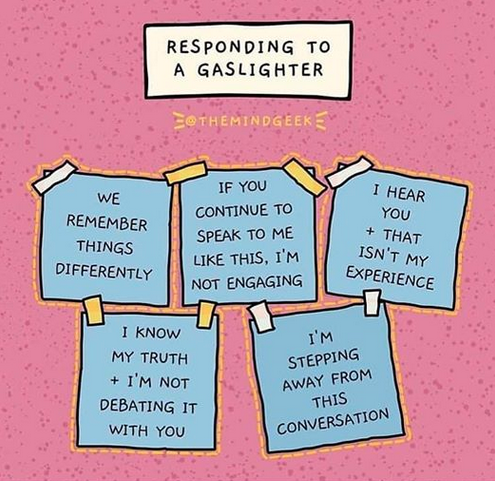
Spiritual Gaslighting Part 1: Is this Happening to You?
“We sometimes look at leaving as a bad thing or associate it with giving up or quitting, but sometimes leaving is the best thing you can do for yourself. Leaving allows you to change directions, to start over, to rediscover yourself and the world. Leaving sometimes saves you from staying stuck in the wrong place with the wrong people. Leaving opens a new door for change, growth, opportunities and redemption. You’re even allowed to leave the old you behind and reinvent yourself.”
-Rania Naim
I grew up in a Portuguese family of mostly lapsed Catholics. My paternal grandmother was devout, however. And she saw my desire for the spiritual aspect of life and made sure that I never lost that natural connection to God. During my formative years, I attended mass with her, prayed alongside her, and had many conversations of a spiritual nature. I completed the studies and rituals involved in gaining my sacraments and when I was twelve, had decided to look into becoming a nun. I started going to the convent every week for further studies and that’s when the trouble started. Although there were aspects of Catholic practice and faith that resonated with me, there were many others that didn’t. As I began to question these beliefs, the nuns became increasingly impatient and hostile towards me. I couldn’t understand why we simply couldn’t have conversations about these topics. There were rules and a hierarchy in this system; it became clear that they were training me to stay within the lines, but my gut instinct wouldn’t let me rest there. At the tender age of thirteen, I had come to my first spiritual crossroads. I knew I couldn’t lend my energy to organized religions that forced me to conform to practices, beliefs, and rules that didn’t square with my values.
I needed a path where I was free to connect with Spirit in ways that felt right to me without all of the dogma from upper church officials that had nothing to do with my connection to Spirit. To my grandma’s disappointment, I left the church. Although I kept up with my prayers and conversations with God, I yearned for a community to practice with that resonated with how I connect with the Divine. Although I value my personal practices, group ceremony and ritual have always been soul-feeding for me. (I loved the ritual of the Catholic Mass as a youngster.) Ironically, it is also the reason I stayed stuck for too long in many situations that I realize in retrospect were harmful for my mental, emotional, spiritual and physical health.
After leaving Catholicism, I drifted solo for another decade before I started exploring different spiritual paths. Several crossroads and many direct experiences later, I have learned a thing or two about a term that started cropping up on my social media feed a few years ago: spiritual gaslighting. Author Mackenzie Eason describes it as “[s]omeone using spiritual concepts to manipulate another into questioning his/her[/their] own sanity, truth, or perception.” In her excellent article (“Spiritual Gaslighting: What it is and How to Recognize it”), she shares some red flags to look for in relationship with any spiritual guru/teacher/authority figure:
- Strong victim mentality
- Very little to zero self-responsibility
- Big emphasis on what “spirit says” as opposed to sharing from their personal truth, feelings, experience
- Refusal to accept or even hear another’s truth, choices, or experience
- Rationalizing the cause of their circumstance as being from other people’s spiritual inadequacy
- A repeating history of very similar painful situations in their lives
- Leaking out their shadow aspect by “Villian-izing” others
On my own journey, I’ve learned the hard truth that even when spiritual knowledge from a tradition resonates deeply with me and the group has good intentions, it is really easy for charismatic people with righteous worldviews to convince themselves they are doing the “right thing” on behalf of others. They often inhabit positions of power where they can twist teachings to justify abusive actions. In my experience, these types of leaders almost never apologize after their reactive episodes. And on the rare occasions that they do, their behaviour does not change in the future–angry outbursts continue to go unchecked because there is no one for them to be accountable to. Attempts to broach the impropriety of these communications are often met with some form of spiritual gaslighting “strongly encouraging” the community member to look at his/her/their ego, shadow patterns, hidden agendas, and issues with authority. In these types of communities, the way forward has to be approved by the leaders before it can be put into practice and they stop being responsive to the needs, visions, and sensibilities of other members.
As someone who experienced trauma early on in life and scores high on the Adverse Childhood Experiences (ACES) scale, I realized that I was being re-traumatized by engaging and that I had to extricate myself from these groups since no mutually acceptable solution was forthcoming despite a lot of effort on my part. I would never allow this to happen to a child in my care and I saw that taking action to protect myself and my health was essential to parenting myself well (and my inner child). In all these cases, walking away–although sad for me–was the only option. I grieved and I moved forward with compassion for myself and others.
It wasn’t until I recently started taking courses in trauma informed parenting and education that I started to put the pieces together of what had happened to me in the past and why I felt so frozen and helpless by these exchanges. It is common for folks who have been abused to think (even unconsciously) that they asked for this treatment and that if only they had behaved in the expected manner, the abuse would not have happened. This is simply false reasoning that is common in brains experiencing a real or perceived threat. The most ancient part of the brain (the amygdala) goes into an automatic response in order to protect us from danger. To protect us, it will cause us to go into these physiological states: fight, flight, or freeze. In working with traumatized folks shamanically and as an educator, I’ve noticed that peoples’ brains tend to cling to one of these responses as a “go-to” mechanism. Whereas someone else might fight back when provoked, another might go into a freeze response. When our “downstairs brain” (the amygdala) is engaged, the “upstairs brain” (the neocortex) that processes incoming information rationally and calmly is temporarily out of order. I’ve learned to have compassion for myself and others in these instances because I know we simply have to wait for cortisol levels to go down before we can act response-ably.
Another thing I learned from studying trauma informed care is that to some extent, we are all descendants of traumatized people. I recently discovered via an Occupational Therapist friend that folks who have a tendency to try to control situations and people around them often have high anxiety levels based on childhood trauma. They attempt to control their environment to feel more secure. We all have hidden triggers that cause this automatic fight-flight-freeze response to unfold in any given situation. The more we can become aware of our triggers, unpack them, and deal with our feelings appropriately (read: not reactively) before having tough conversations with others, the greater our chance of minimizing the harm we can cause by reacting in knee-jerk ways to them. The first step is becoming aware that you are triggered and make a pact with yourself to NOT take action until you feel calm inside and can think clearly again. When we are in a resourceful state and able to reflect, this is the time to come up with strategies for what you will do differently next time you are triggered. Note: In instances where folks are in physical danger, they may need to move to safety during this process. This may seem like a common-sense statement, but many of us who go into a freeze response may have to practice this to train this in. Movement disciplines like martial arts, dancing meditations, and self-defence training can help to create these new pathways in the brain.
I’ve found that folks who have high ACES scores are particularly vulnerable to volatile leaders and authoritarian figures. If you find yourself in this situation with spiritual authority figures, know that:
- You have the right to ask questions and ask for clarity from them.
- You have the right to disagree with them and refuse to take actions that don’t feel right. Good boundaries are vital. Learn to say “no” unapologetically.
- You can trust your gut feelings; when something feels “off,” it often is. Do a ritual on your own to connect with Spirit to get clarity for yourself. You have a direct line to Spirit; we all do. No intermediaries are necessary.
- As a member of the community, your voice (and those of others) matters.
- You have the right to reach out to folks you trust to bounce things off of them that don’t sit right with you (especially if leaders require your silence on these matters). A trusted friend or mentor that is not attached to this issue can help you navigate through your feelings and put things into greater perspective. Reach out for support.
Looking back, I don’t believe I was dealing with folks who were intentionally and maliciously trying to harm me or others. I see that they too were stuck in their automatic trauma responses and old worldviews to respond in reasonable ways to the valid concerns of those around them. Sadly, they believed what their egos and stressed brains were telling them instead of asking some questions that would lead to critical thinking and solutions such as:
- Folks who participate in our community are regularly bringing similar concerns forward: How can we improve what we are doing so everyone feels heard and included?
- What actions can we take to change things that aren’t working for folks in our community?
- Is there a different way of governing ourselves that allows folks to maintain their personal sovereignty within our community?
- What neutral body can we put in place to address issues that come up in the community in order to resolve them so everyone wins?
Stay tuned for part two of this article that will appear in Pagan Pages Magazine next month where we explore how spiritual communities might structure themselves to avoid the spiritual gaslighting trap that leaders and community members can easily fall into.
*This article first appeared in the January 2020 edition of Pagan Pages Magazine.
Recommended Resources:
Nadine Burke Harris’ TED Talk: How early childhood trauma affects health across a lifetime
Video: Explaining the Brain to Children and Adolescents
Article: Why Narcissists and Empaths are Attracted to Each Other


